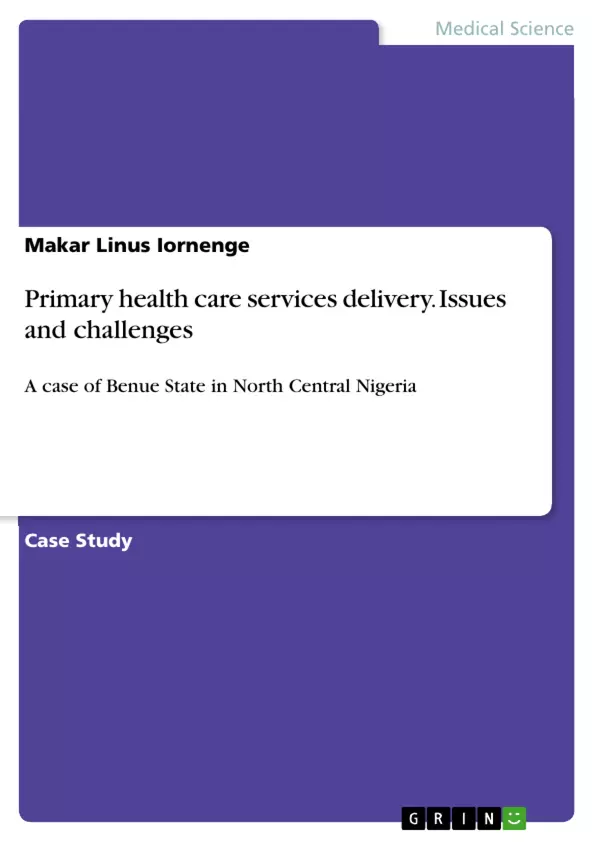The study attempts to explore the impact and challenges of PHC delivery system with the intension of generating data for policy and planning.
The goal of primary health care (PHC) was to provide accessible health for all by the year 2020 and beyond. Unfortunately, this is yet to be achieved in Nigeria and seems to be unrealistic in the next decade. The PHC aims at providing people of the world with the basic health services. Though PHC centers were established in both rural and urban areas in Nigeria with the intention of equity and easy access, regrettably, the rural populations in Nigeria are seriously underserved when compared with their urban counterparts.
About two-thirds of Nigerians reside in rural areas therefore they deserve to be served with all the components of PHC. Primary health care, which is supposed to be the bedrock of the country's health care policy, is currently catering for less than 20% of the potential patients. While most PHC facilities are in various state of disrepair, with equipment and infrastructure being either absent or obsolete, the referral system is almost non-existent.
The goal of the National Health Policy (1987) is to bring about a comprehensive health care system, based on primary health care that is promotive, protective, preventive, restorative and rehabilitative to all citizens within the available resources so that individuals and communities are assured of productivity, social well- being and enjoyment of living.
The health services, based on PHC, include among other things: education concerning prevailing health problems and the methods of preventing and controlling them, promotion of food supply and proper nutrition, material and child care, including family planning immunization against the major infectious diseases, prevention and control of locally endemic and epidemic diseases and provision of essential drugs and supplies. The provision of health care at PHC level is largely the responsibility of local governments with the support of state ministries of health and within the overall national health policy. Private medical practitioners also provide health care at this level.
Table of Contents
- SECTION ONE: INTRODUCTION
- 1.1 Background to the study
- SECTION TWO: REVIEW OF RELATED LITERATURE
- SECTION THREE: ISSUES/GAPS AND OUTCOMES
- SECTION FOUR: CONCLUSION AND RECOMMMENDATIONS
Objectives and Key Themes
This paper explores primary health care delivery in Benue State, North Central Nigeria, focusing on the issues and challenges faced in providing accessible and effective health services to rural populations. The study aims to generate data for policy and planning by examining the existing gaps in PHC services, identifying the underlying factors contributing to low utilization rates, and proposing strategies for improving the situation.
- Challenges of providing primary health care in rural communities
- Factors influencing the low utilization of PHC services
- Role of policy makers and stakeholders in improving PHC service delivery
- Strategies for enhancing community participation and utilization of health services
- Impact of poverty, illiteracy, and cultural beliefs on health outcomes
Chapter Summaries
- SECTION ONE: INTRODUCTION: This section establishes the context for the study by discussing the global health care system, the importance of primary health care, and the specific challenges faced by Benue State in terms of health outcomes and service delivery. It highlights the disparities in access to healthcare between rural and urban populations, emphasizing the need for a more equitable system.
- SECTION TWO: REVIEW OF RELATED LITERATURE: This section delves into existing research on primary health care in Nigeria and other developing countries, analyzing various factors that impact service utilization and health outcomes. It examines the role of government policies, community participation, and health worker capacity in improving PHC delivery.
- SECTION THREE: ISSUES/GAPS AND OUTCOMES: This section focuses on the specific issues and challenges identified in Benue State, analyzing the gap between PHC provision and actual utilization. It examines the impact of these challenges on health outcomes, particularly for rural communities.
Keywords
The primary keywords and focus topics of this study include: primary health care, health services delivery, rural health, Benue State, Nigeria, health equity, health policy, community participation, health worker capacity, health outcomes, utilization rates.
- Citation du texte
- Makar Linus Iornenge (Auteur), 2020, Primary health care services delivery. Issues and challenges, Munich, GRIN Verlag, https://www.grin.com/document/939337



